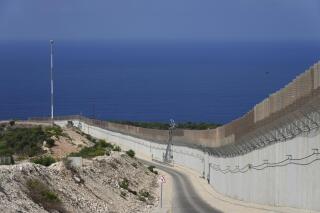Israeli High Court rejects challenges to Lebanon sea deal

FILE - The border wall runs between Israel and Lebanon with the Mediterranean Sea in the distance, in Rosh Hanikra, Israel, on Oct. 14, 2022. Israel’s Supreme Court on Sunday, Oct. 23, threw out four legal challenges to a landmark maritime agreement between Israel and Lebanon, clearing a major hurdle for the deal that could mark a major breakthrough in relations between the two countries. (AP Photo/Tsafrir Abayov, File)
JERUSALEM (AP) — Israel’s Supreme Court on Sunday threw out four legal challenges to a landmark maritime agreement between Israel and Lebanon, clearing a major hurdle for the deal that could mark a major breakthrough in relations between the two countries.
The court did not immediately release its reasons for rejecting the challenges, which were submitted by an influential conservative policy group and an ultranationalist Israeli politician, among others. The court’s ruling paves the way for the agreement to be given final approval by Israel’s the government, a step expected later this week.
Lebanon and Israel both claim some 860 square kilometers (330 square miles) of the Mediterranean Sea. At stake are rights over exploiting undersea natural gas reserves. Lebanon hopes gas exploration will help lift its country out of its spiraling economic crisis. Israel also hopes to exploit gas reserves while also easing tensions with its northern neighbor.
Critics of the deal who had appealed to the court said the current interim government should not be allowed to change Israel’s maritime border or make such weighty, strategic decisions without an electoral mandate.
“Israel has crossed a fundamental democratic line, with a lame duck government agreeing to give up the country’s sovereign territory to an enemy state days before an election,” said Eugene Kontorovich, of the Kohelet Policy Forum, the conservative think tank that had petitioned the court. Israel heads to the polls for the fifth time in less than four years next week.
Israel and Lebanon and formally have been at war since Israel’s establishment in 1948. In 2006, Israel and the Shiite militant group Hezbollah fought a monthlong, inconclusive war and tensions with the group remain high.
Israel says the deal will bolster its security, help stabilize the northern frontier and boost the economy with billions in revenue from any gas discovered.
